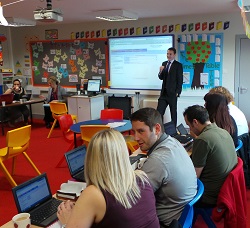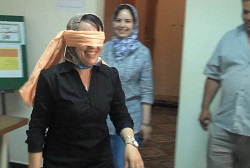I was at a community organisation meeting when I heard a statistic that stopped me dead in my tracks. One in three children in the UK is affected by dementia. This statement made me realise for the first time, the hidden impact of an illness we usually associate with old people. For me it meant a third of the students at my school, Alder Grange in Rawtenstall, would be touched by dementia.
With government funding and a wealth of shared knowledge, Eureka Online College are working with UK schools to offer teachers-in-training a wide variety of exceptional courses in shortage subjects such as Biology, Chemistry, Geography, Maths and Physics. This brings much-needed help to future educators who would normally not be eligible to commence their teacher training due to small knowledge gaps. The organisation offers subject knowledge enhancement (SKE), the government initiative fully funded by the NCTL which aims to increase the pool of potential trainees in a selection of shortage subjects.
These days, as often seen on Twitter, there seems to be examples of great CPD going on all over the place. Inset is delivered by teachers expressly for teachers, TeachMeets are organised and carried out by colleagues all over the country for other like-minded staff keen who go to learn from each other and take home great ideas.
There’s a common assumption that in-house CPD (continuing professional development) is the way forward in schools. After years of poorly presented and ultimately fruitless courses on subjects chosen by others, like rootless flowers, it’s probably safe to say that very often the best development opportunities come for the colleagues we work alongside every day. And while swallowing that for some time, I began to realise I was waiting for someone else to do it for me. I’m getting on a bit. I couldn’t wait any longer.
An exciting and engaging experiential learning resource is being used by teachers to get pupils ‘work ready’. Schools are promoting the employability of their pupils by using Northgate business simulations, where pupils learn about understanding profit and loss, making business decisions, and working as a team all within a risk-free environment.
It is never easy to predict where things are going in the future, but my own attention is really focused on virtual classrooms. These are tools that allow people to present via the internet, and are becoming more and more sophisticated. My current-favourite tool is Adobe Connect. It allows me to present to users all over the world. I can talk through a PowerPoint presentation, play videos, show the participants the screen of my computer, share files with them, set up a chatroom and turn on the webcam so that the participants can see me. It really has a lot of potential. I have noticed that more and more organisations are coming into this territory.
When it comes to health and safety, it’s particularly important for schools to be as prepared as possible. Drew Griffiths gives a concise rundown of what kind of training teachers should seek.

All workers need to be aware of the safety risks associated with their jobs, but for some people this is especially important. For example, as well as protecting themselves from any dangers, teachers have to look after the pupils who are in their care. Protecting students is a big responsibility, and it’s not one that can be taken lightly.
Inset days are often criticised, with both teachers and parents finding them an annoyance. Jane Basnett, Downe House’s head of Modern Foreign Languages, tells us why Inset days need to be remoulded into something worthwhile.

September: So, the lovely, long, hot summer is over. Well, maybe not so hot, but lovely and long anyway. You have rested, recuperated and regrouped. You have done lots of reading for pleasure and reading for work and, if you are lucky, the two will have coincided. You have taken down old displays and planned for some exciting, interactive new ones. Your classroom is ready for action. Lessons are planned and you have had time to let the creative juices flow and design some great new resources. You personally are raring to go, as you have managed to get some down time over the holidays. A few weeks cycling through the Loire, or camping somewhere on Britain's beautiful coastline or perhaps a staycation taking in all the sites you never get round to seeing. Yes, you are ready to come back and face the new term. All you have to do now is get through those first days back, including the dreaded Inset.

No-one would argue against the place of CPD in schools today, but I believe that for many years there has been a lack of coherent processes and management systems guiding it.
This means that many CPD activities may not be as effective as they could be because many schools do not have a clear idea of exactly what works - and what doesn't.
Despite spending £180 million on staff development and training in 2011, the Teacher Development Trust estimated that 37 per cent of English schools have rarely or never evaluated its impact.
If schools don’t have a full picture of the effectiveness of CPD, how can they know where to target their investment in order to help teachers raise attainment?
It may be somewhat of an unspoken truth that some teachers instantly gauge the students' attention, whether by mastering their own pedagogy or just looking slightly scary, while others are simply swamped by a mass of bellowing noises and propelled objects. Maybe a tad too stereotypical.
There is no substitute, nevertheless, as Deputy Head Shaun Allison points out, for teachers to discuss their methods and build up each other's capacity for future development. It is the most original form of collaborative CPD and as such has potential to be the most effective. It raises morale as a team, boosts confidence for implementing new strategies and encourages constructive feedback. In his post, Shaun provides a framework, a case study and additional benefits of coaching:

In 2009, I was fortunate enough to have a book published – The Coaching Toolkit. At the time I had been doing a great deal of work with my co-author, Mike Harbour, to set up coaching in the school where I was working. We started off with a group of interested staff and then grew it across the school – with a great degree of success.
Four years later, in a new school and a very different context, we are looking to launch coaching again. It will be the main driver for CPD in 2013-14, with a view to using our own staff to develop consistently brilliant teaching across the school. Time slots will be put aside throughout the year for colleagues to meet in pairs to have a co-coaching conversation.
Photo credit: cambodia4kidsorg

A community-driven platform for showcasing the latest innovations and voices in schools
Pioneer House
North Road
Ellesmere Port
CH65 1AD
United Kingdom